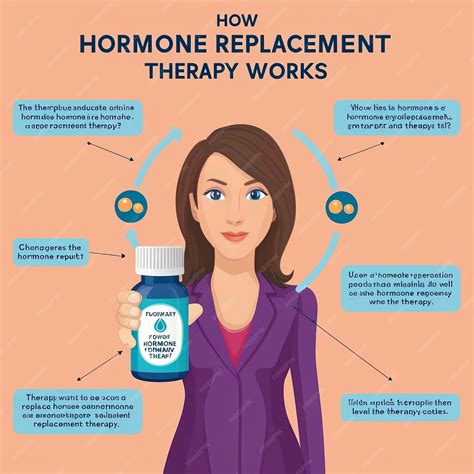What Is Hormonal Replacement Therapy

Hormonal replacement therapy (HRT) is a medical treatment that involves the use of hormones to replace or supplement the natural hormones produced by the body. It is primarily used to alleviate symptoms associated with hormonal imbalances or deficiencies, often seen in conditions like menopause, andropause (male menopause), or certain medical disorders affecting hormone production.
Understanding Hormonal Replacement Therapy

HRT has been a topic of interest and discussion among medical professionals and individuals experiencing hormonal fluctuations. This therapy aims to restore hormonal balance and improve overall well-being. Let’s delve deeper into the specifics of HRT and its applications.
Types of Hormonal Replacement Therapy
There are several types of HRT, each tailored to specific hormonal needs:
- Estrogen Replacement Therapy (ERT): This therapy is commonly used to alleviate symptoms of menopause, such as hot flashes, vaginal dryness, and mood swings. It involves the use of estrogen hormones to replace the natural estrogen levels that decline during menopause.
- Combined Hormone Replacement Therapy (CHRT): CHRT combines estrogen with progesterone, another key female hormone. This combination is often recommended for women who still have their uterus to prevent endometrial cancer. Progesterone helps balance the effects of estrogen on the uterus.
- Testosterone Replacement Therapy (TRT): TRT is designed for men experiencing low testosterone levels, a condition known as hypogonadism. It can help improve sexual function, increase energy levels, and enhance overall well-being.
- Bioidentical Hormone Therapy: This therapy uses hormones that are structurally identical to the hormones produced by the human body. The hormones are typically derived from plant sources and customized to each individual’s needs. Bioidentical HRT aims to provide a more natural hormonal balance.
Hormonal Imbalances and Their Impact
Hormonal imbalances can have significant effects on the body and mind. In women, declining estrogen levels during menopause can lead to various physical and emotional symptoms, including:
- Hot flashes and night sweats
- Vaginal dryness and discomfort during intercourse
- Mood swings, anxiety, and depression
- Bone density loss, increasing the risk of osteoporosis
- Changes in cholesterol levels, potentially impacting heart health
Similarly, men with low testosterone levels may experience:
- Reduced sex drive and erectile dysfunction
- Fatigue and decreased energy levels
- Mood changes, including irritability and depression
- Muscle loss and increased body fat
- Sleep disturbances and reduced cognitive function
The Process of Hormonal Replacement Therapy
HRT is typically prescribed by healthcare professionals, including endocrinologists and gynecologists. The process involves a thorough evaluation of an individual’s medical history, current symptoms, and hormone levels. Blood tests are often conducted to assess hormone levels accurately.
Once the diagnosis is made, the healthcare provider will determine the most suitable type of HRT and the dosage required. HRT can be administered through various methods, including:
- Oral Tablets: Hormone pills are a common and convenient method of HRT administration.
- Patches and Gels: Transdermal patches or gels allow for gradual hormone absorption through the skin.
- Injections: Hormone injections are typically given less frequently, often every few weeks or months.
- Vaginal Rings: These small, flexible rings release hormones directly into the vaginal tissue.
- Implants: Hormone implants are small devices inserted under the skin, providing a steady release of hormones.
Benefits and Considerations of HRT
Hormonal replacement therapy offers several benefits, including relief from menopausal symptoms, improved bone density, and enhanced sexual function. It can also help reduce the risk of certain health conditions associated with hormonal imbalances.
However, it’s important to consider potential side effects and long-term risks. Some individuals may experience:
- Breast tenderness or swelling
- Headaches or migraines
- Nausea and vomiting
- Weight gain or fluid retention
- Increased risk of blood clots and stroke (especially with long-term use)
The decision to undergo HRT should be made in consultation with a healthcare professional, who can provide personalized advice based on individual health needs and goals.
Future Trends and Innovations in HRT
The field of hormonal replacement therapy is continually evolving. Researchers are exploring new ways to deliver hormones, such as through nasal sprays or even wearable devices. Additionally, personalized medicine approaches are gaining traction, allowing for more tailored HRT regimens based on an individual’s unique genetic makeup and hormonal needs.
As our understanding of hormones and their impact on the body deepens, we can expect further advancements in HRT, making it safer and more effective for those seeking relief from hormonal imbalances.
| Hormone Type | Common Uses |
|---|---|
| Estrogen | Menopause symptom relief, bone health |
| Progesterone | Endometrial protection, menstrual cycle regulation |
| Testosterone | Low testosterone levels in men, sexual function |
| Bioidentical Hormones | Natural hormonal balance, individualized treatment |

What are the potential side effects of HRT?
+Potential side effects of HRT may include breast tenderness, headaches, nausea, weight gain, and an increased risk of blood clots. These side effects can vary depending on the type of HRT and individual factors.
How long does one typically stay on HRT?
+The duration of HRT can vary. Some individuals may require long-term therapy, while others may benefit from short-term use. The decision is typically made based on individual needs and the severity of symptoms.
Are there natural alternatives to HRT?
+Yes, some individuals explore natural alternatives like herbal remedies or lifestyle changes. However, the effectiveness of these alternatives can vary, and it’s important to consult with a healthcare professional before making any significant changes.



